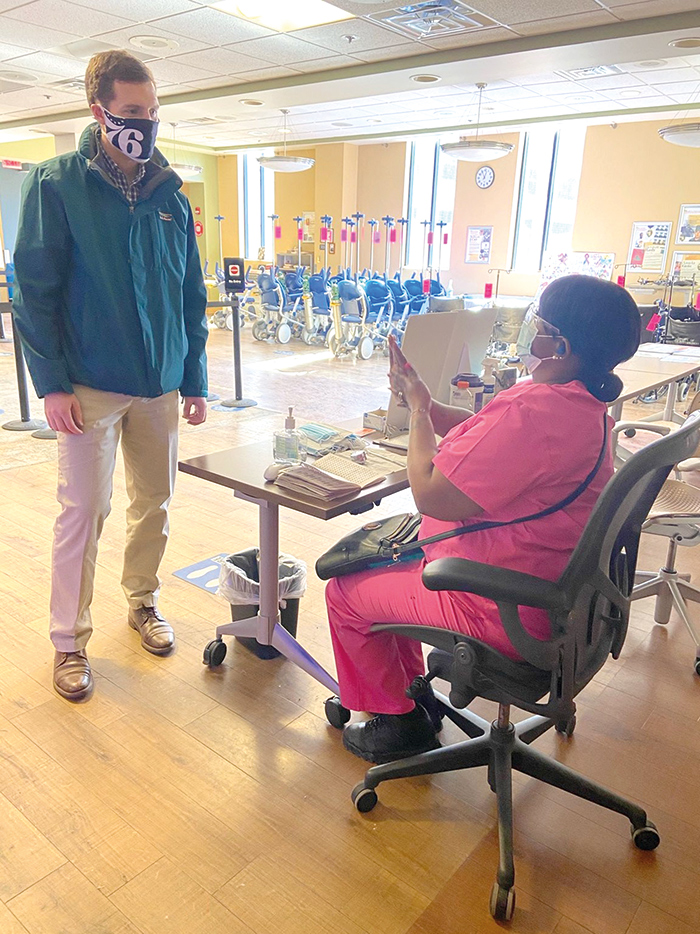Photo Courtesy Rep. Pressley’s Office
Rep. Ayanna Pressley, Rep. Lamb, and Rep. Deutch are on the Task Force on Aging & Families.
By Forum Staff
Last week, as adults 65 and older account for approximately 80 percent of COVID-19 deaths in the U.S., the House Democratic Caucus Task Force on Aging & Families announced a letter sent to President Joe Biden, Speaker Nancy Pelosi and Senate Majority Leader Chuck Schumer outlining specific measures to strengthen COVID-19 assistance to seniors. The below letter follows the Task Force’s request to the Biden Administration to appoint a geriatrician or expert in aging services to the President’s COVID-19 Advisory Board.
Topline Policy Recommendations to Assist Older Americans:
Streamline the vaccination infrastructure with seniors in mind and provide the clear, necessary guidance and funding to support states in this effort.
Prioritize seniors of color in vaccine engagement.
Strengthen senior-specific nutritional and housing support to meet the rising and unprecedented needs of isolated and food-insecure adults.
Expand and better train the workforce that cares for older adults.Prioritize incarcerated seniors for compassionate release and vaccine engagement.
“The American Rescue Plan outlines a strong national directive to fight the pandemic, focuses on high-risk and hard-to-reach populations, and addresses racial inequities in the pandemic response. We are especially encouraged by the plan’s emphasis on improving vaccine distribution for seniors, a constituency that has borne the brunt of the coronavirus pandemic,” said the Task Force Members in their letter, dated Feb. 9. “While the American Rescue Plan has many important provisions to help older Americans, it is imperative that our response matches the severity of this crisis and the toll it has taken on this population.”
The task force indicated that in order to ensure a comprehensive response to address needs, “we urge you to strengthen COVID-19 assistance to seniors by including and implementing the following policies:
Streamline the vaccination infrastructure with seniors in mind and provide the clear,necessary guidance and funding to support states in this effort.
Sign up methods, distribution centers, and outreach strategies all must be streamlined and simplified to reach seniors–in particular, those who may not have access to technology. For example, only 65 percent of adults over the age of 65 have an online medical account, which is a common way to sign up for vaccines. 3As more seniors become eligible for vaccines in their states, we have received thousands of calls from distraught and frustrated seniors who are unable to navigate the often multi-website, online-focused strategy. We urge the Administration to work with states to develop 1-800 numbers for scheduling vaccine appointments that are centralized, well-staffed, and offer culturally competent customer service in several languages, as suggested by AARP. Finally, vaccines should be brought closer to seniors with distribution sites at easily accessible and secure locations such as senior centers and other aging service network providers. A streamlined, easily accessible sign-up is critical to protecting the nation’s older and vulnerable Americans.
Prioritize seniors of color in vaccine engagement. We must meet seniors where they are and ensure that vaccine rollouts across the country are informed by their specific needs. In order to reach marginalized seniors who face compounding disparities, it is important that the Department of Health and Human Services and related agencies issue guidance that strategically engages community-based organizations. Communities of color have expressed strong distrust in the healthcare system as compared to their white counterparts, and COVID-19 vaccine hesitancy in Black communities remains high. Community and faith-based organizations have the trust of seniors, have a well-established history of serving older adults of color, and are repeatedly considered the surest method for connecting with under-reached communities. Moreover, using distribution centers that align with seniors’ social and support networks increases their access to vaccine information and equity in who receives a vaccine first.
Strengthen senior-specific nutritional and housing support to meet the rising and unprecedented needs of isolated and food-insecure adults. Recent research has found a 107 percent increase in isolation for adults age 50-80 from October 2018 to June 2020. Additionally, by July 2020, there was a nearly 60 percent increase in older adult food insecurity, with 13.5 percent of adults over 60 experiencing this challenge. While we are proud that the American Rescue Plan includes nutritional support funding, none is currently set aside specifically for seniors. Both food insecurity and housing hardships have increased throughout the country during the pandemic and disproportionately affect individuals of color. Increased funding to the Older Americans Act and further investment in the OAA Nutrition Program can significantly reduce the housing and food insecurity challenges seniors face. Similarly, additional funding should be allocated for low-income older adults, additional assistance for renters and homeowners, and greater opportunities for seniors to age in place. Medicare and Medicaid funds should be used to promote the health of older adults in all forms of senior housing, and the Federal Medical Assistance Percentage should be increased for Medicaid-funded home and community-based services.
Expand and better train the workforce that cares for older adults. Supporting an age-friendly public health system begins with appointing a geriatrician or expert in aging services to 3 the COVID-19 Advisory Board. In December, the Task Force sent a letter to the Biden-Harris Transition Team imploring that it is imperative to have such an individual on the Advisory Board to represent the needs of at-risk older adults. We stand ready to assist the Administration in making this appointment and believe the input of a geriatrician or aging services expert is an essential component of a robust federal response to the pandemic. While the percentage of the population over 65 increases, the geriatric workforce is decreasing, adding to an already existing shortage in providers. Across our public health and health care delivery system, efforts to increase the recruitment and retention of geriatric specialists should be prioritized in order to meet the care needs of a rapidly aging U.S. population. Providing federal support for education and training in geriatric principles and strategies for all providers is an important step to meeting this goal.
Prioritize incarcerated seniors for compassionate release and vaccine engagement. We also urge you to support the compassionate release of incarcerated individuals who are elderly. More than 10 percent of the federal prison population is older than 55 years old, and many have underlying health conditions and pose no risk to public safety. Compassionate release would address the intersectional risks that older adults with co-morbidities living in congregate settings face.



